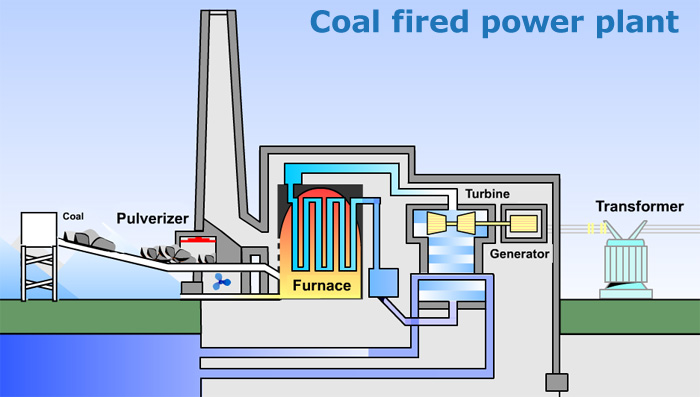
Govt abandons coal-fired power plants, finally

Finally, the government has decided to discontinue the contracts of coal-fired power projects to stop risky investment in power generation and protect environment from the 'dirty fuel'.
Although a quarter of the population still lacked access to electricity a research found that demand for power in 2030 will only require 29,619MW of generating capacity which is contradictory with the Power Sector Master plan (PSMP) - 2016.
PSMP targeted to produce 46,000MW of electricity by this time to meet the country's demand with coal, Power Division think tank Power Cell said.
"We don't need to move fast. One third of the country's power plants currently lie idle. Nationwide utilisation rates are low and the government is suffering losses - taking all these issues in cognizance including the environment we are set to discontinue the pipeline contracts of the coal-fired power projects," Power Cell DG Mohammad Hossain told the Daily Observer on Saturday.
He said the government was considering a realistic electricity demand and improving its methodologies. So we are reviewing the coal-based power projects to address many issues collectively.
Currently, the government is working on three major power generation hubs at Payra in Patuakhali, Maheshkhali and Matarbari in Cox's Bazar.
The government has undertaken 13 mega coal-based power projects in cooperation with China, Japan, India, Malaysia, South Korea and Singapore. The construction of 1,200MW coal-fired power plant at Matarbari is expected to go into operation by 2023.
On the other hand, the work is going on to set up a 1320 MW power plant at Rampal in Bagerhat. However, Payra is in production. But the others are in a very premature stage.
If the proposed coal-fired power plants start operations, then Bangladesh will release an additional 115 million tonnes of carbon dioxide (CO2) annually in the atmosphere.
Bangladesh's plan to expand its coal-fired power plants is completely inconsistent with the Paris Agreement in which Bangladesh is a signatory.
The United Nations Environment Programme report suggests that this expansion risks Bangladesh being locked into a carbon-intensive development path, which will stop Bangladesh from reaping benefits of cheap, clean renewable energy.
However, according to the PSMP-2016, the government mulled to produce 33,250MW of electricity from imported coal by 2030 which is 63 times more than the existing scenario. The country is now producing around 525 megawatt (MW) electricity generated from the only coal-based plant in Dinajpur and Payra (not on regular basis).
"Those projects are in a bad shape or did nominal jobs and we are to stop them first," a senior official of the Power Division said.
However, environmentalists alleged that India or China export air pollution by financing coal-fired power plants in Bangladesh and the government has failed to protect its sovereign interest by opening its border to investments that carry a great heath risk.
"Many Indian states have stopped approving new coal-fired plants and India has pledged to more than double its non-fossil fuel power generation capacity while it finances the environmentally disastrous coal-fired plant near the Sunderbans in Bangladesh.
In 2016, Chinese investors doubled down on their investments in coal power in Bangladesh but pulled the plug on more than a hundred coal power projects within its borders," they said.
TIB Executive Director Iftekharuzzaman earlier said the government had undertaken many power plant projects defying 'acceptable' environmental assessment reports.
"We're fighting climate change and at the same time emphasising on coal power expansion. This is completely a two-faced attitude," he said, urging the government to stop constructing of the ongoing coal-fired power plant projects until comprehensive environmental assessment.
He said 1200 MW Matarbari coal-fired power plant is a Jica financed project. Jica (Japan International Cooperation Agency) itself conducted the environmental assessment.
The government should stop all these activities for the grater interests of the country and its people.
"The government is taking many projects which are against the Paris Agreement and a major obstacle to attain the sustainable development goals (SDG) fully. Finally we could be able to give them an understanding that these are bad projects and bad investment," CAB Energy Adviser Professor Shamsul Alam said.
He said 'Speedy supply of power and energy law' gives the government the power to bypass the usual open competitive bidding process and fast-track and simplify power plant approvals as well as to give development rights directly to investors (including overseas investors) submi
Editor & Publisher: S. M. Mesbah Uddin
Published by the Editor from House-45,
Road-3, Section-12, Pallabi, Mirpur
Dhaka-1216, Bangladesh
Call: +01713180024 & 0167 538 3357
News & Commercial Office :
Phone: 096 9612 7234 & 096 1175 5298
e-mail: financialpostbd@gmail.com
HAC & Marketing (Advertisement)
Call: 01616 521 297
e-mail: tdfpad@gmail.com